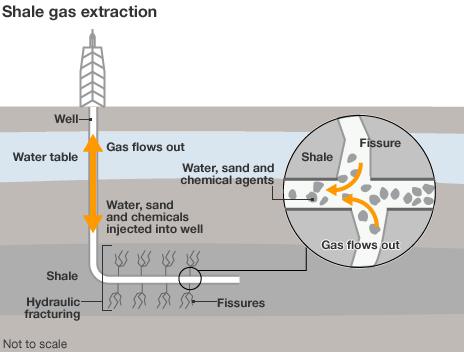Blackpool Shale Gas drilling suspended after quake
- Published
Tests are being carried out to find out if the drilling caused the quake
Shale gas test drilling in Lancashire has been suspended following an earthquake on the Fylde coast.
Cuadrilla, the firm behind the tests, said drilling had been suspended as a precaution after the 1.5 magnitude tremor - the second in two months.
It will now examine the data collected by the British Geological Survey (BGS) before deciding whether to resume.
A tremor centred on Poulton-le-Fylde on 1 April shared a "similar location and mechanism", the BSG said.
Shale gas drilling, known as "fracking", involves shattering hard shale rocks underground to release gas using either hydraulic pressure or tiny explosions.
Mark Miller, chief executive of Cuadrilla Resources, said: "We take our responsibilities very seriously and that is why we have stopped fracking operations to share information and consult with the relevant authorities and other experts.
"We expect that this analysis and subsequent consultation will take a number of weeks to conclude and we will decide on appropriate actions after that."
'Quake risk'
The process has proved controversial in the US with environmentalists alleging that shale gas leaking into their drinking supply could cause tap water to ignite.
But earlier this month the Commons energy select committee called on ministers to support the process in the UK arguing that environmental problems associated with it in the US could be overcome by tight regulation and good industry practice.
The BGS said it was also monitoring fracking as a precaution. There have been two small earthquakes in Lancashire since fracking began in the county in March, including the latest on Friday.
In an analysis of the April quake published on its website the BGS said: "Any process that injects pressurised water into rocks at depth will cause the rock to fracture and possibly produce earthquakes.
"It is well known that injection of water or other fluids during the oil extraction and geothermal engineering, such as Shale gas, processes can result in earthquake activity."
The BGS said the April tremor took place 1.2 miles (2km) away from the drilling site but said its monitoring instruments were 50 miles (80km) away.
Speaking about the latest quake, Dr Brian Baptie, head of seismology at the BGS, said: "The earthquake was felt by at least one person in Poulton-Le-Fylde.
"Our analysis places the epicentre of the event to within 2km of the Preese Hall site.
"Data from two temporary instruments close to the drill site, installed after the magnitude 2.3 earthquake on 1 April, indicate that the event occurred at a depth of approximately 2km (1.2 miles).
"The recorded waveforms are very similar to those from the magnitude 2.3 event last month, which suggests that the two events share a similar location and mechanism."

- Published28 May 2011
- Published24 May 2011
- Published28 March 2011
- Published1 April 2011